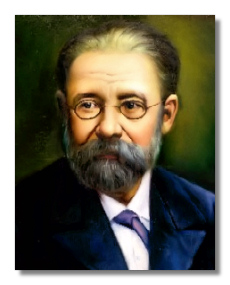November: Bedřich Smetana's Má Vlast
Posted: Wed Oct 24, 2012 8:35 pm

Bedřich Smetana.
Born into a large family in the small town of Leito-mischel, Bedrich Smetana showed exceptional musical talent as a child, performing on the violin and piano at the age of 5 and writing his first compositions at 8. Despite his father's opposition to his musical training, he quickly gained a reputation as a pianist through his performances of the works of Franz Liszt. After moving to Prague in 1844, Smetana became music teacher to the family of the wealthy Count Thun but left after 4 years. With the help of Liszt, Smetana founded his own piano school.
In 1856 Smetana accepted a position as conductor of the Philharmonic Society of Göteborg, Sweden. While there he wrote his first important symphonic poems, including Wallenstein's Camp (1859) after Friedrich von Schiller's great dramatic trilogy. During this time, events were changing in Bohemia. Austria, weakened from futile attempts to maintain control over Italy, granted Bohemia political autonomy in 1860, which elicited strong national feelings from the Bohemians. The following year Smetana returned to Prague to become a leader in the new movement, the first substantial result of which was the establishment in 1862 of a theater where opera and drama could be presented in the Czech language.
On 27 June 1873 an article appeared in the Czech musical periodical Dalibor in which V.J. Novotný, stated that Smetana was planning to write a series of symphonic poems on subjects which had strong associations with Czech history and legend. Smetana had been considering this project for several months, and is believed to have been sketching the first of the new series of symphonic poems before he completed his fourth opera, Libuše, on 12 November 1872. The general title of the work was to be Vlast (Fatherland).




